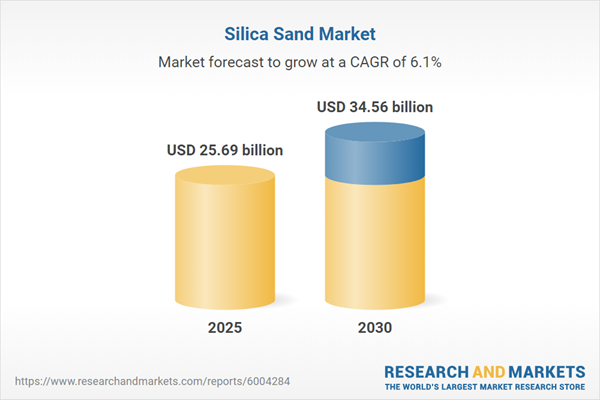The silica sand market is experiencing notable growth driven by its versatile applications and favorable properties, including high silica content, heat resistance, and chemical stability. Silica sand is integral to industries such as glass manufacturing, foundry casting, hydraulic fracturing, water filtration, road construction, and coatings. The market's expansion is propelled by increasing urbanization, rising per capita income, and supportive government policies, though challenges like illegal sand mining and the emergence of sand-free construction alternatives pose concerns.
Market Drivers
The primary growth driver is the surge in construction and manufacturing activities, fueled by global urbanization and increasing disposable incomes. These trends have heightened demand for silica sand in applications like glass production and infrastructure development. Additionally, the rise in hydraulic fracturing, driven by increased shale gas and oil exploration to reduce reliance on crude oil, significantly boosts silica sand demand. Government initiatives supporting industrial growth and resource extraction further enhance market prospects. However, illegal sand mining and the development of sand-free construction products threaten market stability, necessitating regulatory oversight and sustainable practices.Market Segmentation
The market is segmented by application and geography. Key applications include foundry casting, glass manufacturing, hydraulic fracturing, and others such as water filtration and coatings. Foundry and glass manufacturing remain significant due to silica sand's critical role in producing high-quality castings and glass products. Hydraulic fracturing is a growing segment, driven by energy sector demands. Geographically, the market spans North America, South America, Europe, the Middle East and Africa, and Asia Pacific, with regional demand shaped by industrial activity, infrastructure development, and resource availability. Key countries within these regions exhibit varying growth patterns based on local economic and regulatory factors.Industry Analysis
The report employs Porter's Five Forces model to evaluate the competitive dynamics of the silica sand industry, highlighting factors such as supplier power, buyer influence, and competitive rivalry. An industry value chain analysis identifies key players involved in extraction, processing, and distribution, providing insights into their contributions across sectors. The regulatory framework is also examined, offering stakeholders a clear understanding of policies impacting market operations. This includes environmental regulations addressing illegal mining and sustainability concerns, which are critical for long-term market stability.Competitive Landscape
The competitive landscape is detailed through a vendor matrix categorizing key players into leaders, followers, challengers, and niche providers based on their strategies and market positioning. This analysis helps stakeholders identify dominant firms and emerging players, offering insights into market share dynamics and strategic initiatives. The report emphasizes the importance of innovation and sustainability in maintaining a competitive edge.The silica sand market is poised for growth, driven by urbanization, industrial demand, and energy sector needs, particularly in hydraulic fracturing. However, challenges like illegal mining and alternative materials require strategic responses. With a comprehensive analysis of applications, regional dynamics, and competitive strategies, the market presents opportunities for stakeholders to capitalize on rising demand while navigating regulatory and environmental challenges. The focus on sustainable practices and regulatory compliance will be critical for ensuring continued market expansion across diverse geographies and applications.
Key Benefits of this Report:
- Insightful Analysis: Gain detailed market insights covering major as well as emerging geographical regions, focusing on customer segments, government policies and socio-economic factors, consumer preferences, industry verticals, and other sub-segments.
- Competitive Landscape: Understand the strategic maneuvers employed by key players globally to understand possible market penetration with the correct strategy.
- Market Drivers & Future Trends: Explore the dynamic factors and pivotal market trends and how they will shape future market developments.
- Actionable Recommendations: Utilize the insights to exercise strategic decisions to uncover new business streams and revenues in a dynamic environment.
- Caters to a Wide Audience: Beneficial and cost-effective for startups, research institutions, consultants, SMEs, and large enterprises.
What do businesses use our reports for?
Industry and Market Insights, Opportunity Assessment, Product Demand Forecasting, Market Entry Strategy, Geographical Expansion, Capital Investment Decisions, Regulatory Framework & Implications, New Product Development, Competitive Intelligence.Report Coverage:
- Historical data from 2020 to 2024 & forecast data from 2025 to 2030
- Growth Opportunities, Challenges, Supply Chain Outlook, Regulatory Framework, and Trend Analysis
- Competitive Positioning, Strategies, and Market Share Analysis
- Revenue Growth and Forecast Assessment of segments and regions including countries
- Company Profiling: Strategies, Products, Financial Information, and Key Developments among others
Different segments covered under the silica sand market report are as below:
By Application
- Foundry
- Glass Making
- Hydraulic Fracturing
- Construction
- Ceramics
- Chemical Production
- Filtration
- Paints and Coatings
- Metallurgy
- Sports and Leisure
- Electronics
By Renewable Energy
- Solar Panel Manufacturing
- Wind Turbine Components
- Energy Storage Systems
By Geography
- North America
- USA
- Canada
- Mexico
- South America
- Brazil
- Argentina
- Others
- Europe
- Germany
- France
- United Kingdom
- Spain
- Others
- Middle East and Africa
- Saudi Arabia
- UAE
- Others
- Asia Pacific
- China
- Japan
- India
- South Korea
- Indonesia
- Thailand
- Others
Table of Contents
Companies Mentioned
- SCR-Sibelco N.V.
- Mitsubishi Corporation
- Chongqing Changjiang River Moulding Material (Group) Co., Ltd.
- U.S. Silica
- Quarzwerke GmbH
- JFE Mineral & Alloy Company
- Mangal Minerals
- Badger Mining Corporation
- Euroquarz GmbH
- Covia Holdings LLC
Table Information
| Report Attribute | Details |
|---|---|
| No. of Pages | 145 |
| Published | August 2025 |
| Forecast Period | 2025 - 2030 |
| Estimated Market Value ( USD | $ 25.69 billion |
| Forecasted Market Value ( USD | $ 34.56 billion |
| Compound Annual Growth Rate | 6.1% |
| Regions Covered | Global |
| No. of Companies Mentioned | 10 |









